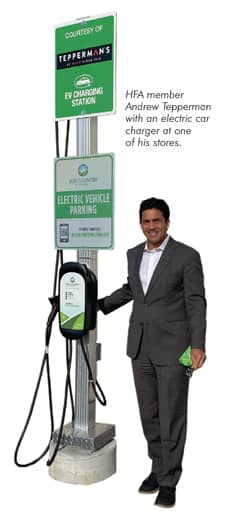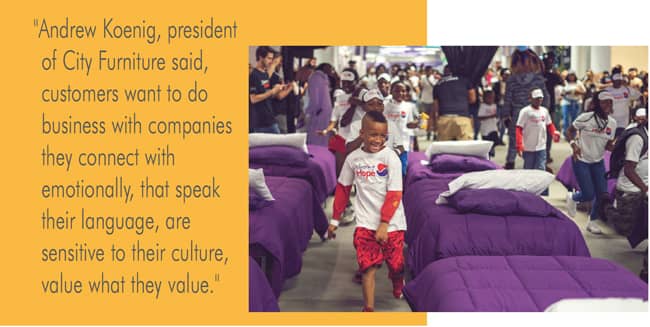
Furniture retailers have
struggled to provide affordable coverage for workers.
Why offer health insurance to your employees? For starters, your business can deduct the cost of premiums from your federal business taxes. Some small businesses may qualify for a tax credit.
Besides being the right thing to do, studies have shown that a robust benefits package can appeal to both new hires and current employees alike while setting your business apart from your competitors. Those same studies show that employees who are content with their jobs and health benefits are happier, more productive employees. They also take fewer sick days because they’re receiving good health care.
For years we’ve heard our members speak loudly and passionately about the need for a health plan they could offer employees. Finding the right plan was a little like Goldilocks romping through the forest. Some health plans seemed affordable – at least until you dug a little deeper and learned they were skimpy on benefits. Others had everything you could ever ask for – including ridiculously expensive monthly premiums.
I’m pleased to announce the Home Furnishings Association will offer an association health plan we think is just right. Our new plan, which we expect to roll out later this year, would not have been possible just a few years ago. Recent changes by the Department of Labor loosened restrictions to an association health plan (AHP), allowing more businesses to participate.
Many furniture retailers have struggled to provide affordable coverage for workers, given the small size of their risk pools. With the new rules, coverage offered to employees of big companies will soon be available to HFA members and their employees.
We’re convinced our association health plan will be a game-changer for many of our members. But before that happens, we need to hear from you! There’s no obligation. Just contact your member specialist at https://myhfa.org to discover how this exciting new program can work for you and your employees.
Re-imagined Resource Center
Days after High Point’s fall market ended, workers began tearing down the HFA Resource Center from wall to wall, working non-stop to ensure the space was ready for spring market. Retailers who visit the next show will find a new seminar room – more than twice the size of the old one – to accommodate presentations by industry leaders.
Thanks to the work of Connie Post and her team at Affordable Design Solutions, retailers will experience touches including comfortable seating furnished by Decor-Rest in a warmly lit, open lounge. There will also be easily accessible power, complimentary wireless internet, spacious private meeting rooms, and an updated café with complimentary beverages and healthy snacks.
The new Resource Center will support the HFA’s initiatives in the areas of Leadership, Innovation and Education.
All retailers — HFA members and non-members — are invited to the Resource Center, located on the first floor of Market Suites.
As state tax compliance gets more complicated, retailers are scrambling to catch up.
— By Robert Bell
For furniture retailers who do business entirely in a single store in one state, keeping up with sales-tax requirements is relatively simple. If that state has a sales tax, retailers charge the rate that applies where the store is located. If they deliver to customers who live in a different local jurisdiction that has a separate sales tax, the seller should add that.
It’s when a company operates stores in several states and local taxing jurisdictions, regularly drawing customers across state lines that things get more complicated.
Royal Furniture
Home Furnishings Association member Royal Furniture in Memphis, Tennessee, recently hired an outside company to handle its sales-tax compliance programs, according to Michael Faber, Royal’s president.
Memphis sits just across the Mississippi River from Arkansas, only a few miles north of the Mississippi state line. Royal Furniture operates stores in Mississippi, Alabama and Tennessee.
The company, founded in Memphis in 1946 with a single store, eventually turned to an automated sales-tax reporting and filing service. The company it chose is Avalara, one of many that works to increase sales tax compliance and reduce audit risk.
“We’re not going to have to keep up with it,” Faber said. “They’re going to have to keep up with it.”
Sheffield Furniture & Interiors
John Gebhardt who handles accounting and human resources for Severegn Furniture Management, owner of Sheffield Furniture & Interiors, isn’t ready for that step yet. He readily admits, however, to the difficulty of figuring out all the sales-tax requirements in several states.
“The rules are changing, and it’s confusing,” he said. Sheffield Furniture & Interiors, a member of the Home Furnishings Association, operates showrooms in Pennsylvania, Virginia and Maryland.
The most vexing problem is “trying to determine the taxability of services, what is taxable and what is not,” Gebhardt added.
He’s aiming at a moving target, as more states are imposing taxes on services in addition to goods. Sheffield offers design services, as well as installation of window treatments, rugs and application of Guardsman protection and repairs. It’s often unclear what services, if any, are covered by a state’s tax code. And each state seems to differ from the next.
Diane Yetter understands. “That’s why I’m in business,” she said. “That’s exactly why I’m in business.”
Yetter runs the Sales Tax Institute, which she founded in 1996 in Chicago. Its website offers free resources about sales-tax laws in all 50 states. The institute provides on-site professional education. Yetter and staff members are available for paid consultations, webinars, speaking engagements and other services.

Delivering Across State Lines
One source of difficulty stems from delivering furniture, or services, across state lines. If a customer lives in another state and wants the goods delivered to his or her residence or business in that state, the “norm,” according to Yetter, is that the tax is owed in that location. But, “whether or not you’re required to collect it is a completely different question,” she said of the seller.
Often, even the
temporary presence
of a truck and crew
making deliveries can establish nexus.
|
Some states place the responsibility for paying the tax on the purchaser. Whether the customer pays or doesn't isn’t the seller’s concern. But the difference may be a matter of how the goods are delivered. If the retailer delivers a sofa, the retailer likely is required to collect the sales tax based on the cost of the sofa. In some states, such as New Jersey, the tax is based on the cost of the sofa and delivery. But if the retailer sends the sofa via a common carrier, the tax obligation usually falls to the purchaser.
Another factor that helps determine sales-tax obligations is economic nexus. A retailer establishes nexus with a physical location of a store, warehouse, office or any other facility. With nexus comes the responsibility to collect sales tax from a purchaser. Often, even the temporary presence of a truck and crew making deliveries can establish nexus. Many states also have enacted laws that create economic nexus even if the seller doesn’t have a physical presence. In that case, the seller would be required to collect the tax once its annual sales into that state reach a threshold, which generally ranges from $100,000 to $500,000. So, careful record-keeping is important.
For retailers who deliver furniture in relatively small amounts to customers in only a few states, keeping track of the various tax requirements can be manageable, Yetter said. It’s when the numbers climb that the complexity multiplies. Then, hiring an outside firm might be worthwhile.
The best solution would be a uniform national approach to sales taxation. “I would not hold my breath waiting for any sort of federal action,” Yetter said.
Darvin Furniture and Mattress uses a social media
influencer to reach a new audience.
— By Robert Bell

Customers who follow Darvin Furniture and Mattress' social media have met two influential people this year.
One is Gianna Cosentino, who is featured in a series of short videos. The other is company President Will Harris, who makes cameo appearances in some of the same videos.
“Hi, I’m Gianna,” Cosentino says in the inaugural video, which debuted on Darvin’s Facebook, Twitter and Instagram pages Jan. 27. “Some of you may know me from my Instagram page, bloomstonebay. Today, I’m at Darvin Furniture, where newlyweds can find a huge selection of quality, stylish furniture, without breaking the bank.”
Her parents always bought Darvin furniture, and when she got married, she became a customer as well. That long relationship gives her credibility.
|
Cosentino is a paid influencer, part of a marketing trend. The Home Furnishings Association offered a seminar on social media influencers at the Las Vegas Market in January. It was led by Ellen Gefen of Gefen Marketing.
Cosentino, with more than 5,000 Instagram followers, fits the bill perfectly. She’s warm, personable, engaging, knowledgeable and – perhaps most important – genuine. She may be paid to talk up Darvin Furniture, but she was already doing that.
“She grew up with Darvin,” Harris said. “Her parents always bought Darvin furniture, and when she got married, she became a customer as well.”
That long relationship gives her credibility. The people who are interested in what she has to say about family and lifestyle matters may be influenced by what she likes and recommends. When Darvin approached her, “she jumped at the opportunity,” Harris said.
He took advantage of the opportunity, too, by making brief appearances in several videos. “It’s a subtle way of introducing me as well,” he said.
Harris became president of the Orland Park, Ill., Top 100 retailer in January after spending 16 years at Harris Family Furniture in New Hampshire. His roles were limited to smiles until the fourth video, posted Feb. 17, when Cosentino says:
“As a newlywed, I believe husbands and wives should both have a say when picking out their furniture for their first home. It will help create that even balance. What about you, Will? Did you have an opinion in your first home?”
“Well,” he says, “my opinion was, ‘Whatever you want, honey.’”
“The perfect man,” Cosentino concludes.
The videos set a light, humorous tone, conveying the idea that customers will find a friendly environment when they visit the store. “Furniture is supposed to be fun,” Harris said.
He’s been pleased with the series so far, he said in an interview. The videos are reaching people who haven’t known much about Darvin and are making a favorable impression. “We’ll have to see how it translates to sales, but for now it’s fun,” Harris said.
Consumers look for retailers to take the lead on social and environmental issues. What message are you sending them?
— By Robert Bell
Home Furnishings Association member Andrew Tepperman wasn’t sure how his community would react to the electric car charger installed in the parking lot of one of his six Ontario, Canada, furniture stores. Nor did he care. Tepperman is one of many HFA members pushing strong corporate social responsibility in the business – not because he thinks it’s good business sense, but because he believes it’s the right thing to do.
Three Cats merges a dining room with a furniture showroom and gift shop featuring Michigan items. Your dining table may be for sale. As you eat, you’ll see shoppers browsing or visitors snapping pictures of the eye-catching decor. Old movies play on a large TV screen, preserving the theater motif. Recently, an art show provided more entertainment.
Turns out both ideas can co-exist.
Within the first month, members of a local electric car club asked store officials if they could hold their weekend meetings in the store’s parking lot. Tepperman shrugged: Sure, why not?
Before the electric car geeks found their asphalt meeting space, none of the club members had ever set foot inside a Tepperman’s showroom. Yet many of them ended up buying furniture from their new friends. A few weeks later, Tepperman received an email from a stranger:

“Dear Andrew, My wife and I were driving to Lowe’s to purchase appliances. My electric car was running low on battery. I have an app that directs me to the closest charge station. That led me to your parking lot. I plugged in. To kill some time while it charged, my wife and I walked into your store and were completely surprised. We had never heard of your company. In the end, we purchased five appliances from you. Thank you for the free charge.”
That “free charge” generated more than $2,000 in sales. That was three years ago. Tepperman, president of the family-owned chain, keeps the note to remind him of something other HFA members are starting to catch on to: Besides being the right thing to do, corporate social responsibility – initiatives that a business takes toward environmental or social well-being – makes good business sense, too.
But how good? For years, retailers as large as Nike and as small as Tepperman’s have tried to quantify what a meaningful corporate responsibility program can add to a company’s bottom line. According to a 2019 report by the Reputation Institute, a reputation measurement and management services firm, a five percent increase in corporate responsibility increases purchase intent by eight percent and levels of trust by six percent.
HFA member Andrew Koenig, president of City Furniture in Tamarac, Fla., said customers want to do business with companies they connect with emotionally, that speak their language, are sensitive to their culture, value what they value. They want to work with companies that care about the greater good, not just the bottom line. “And when you understand that and align your values with the people you serve, both of you are going to benefit. How can you not?”
In today’s fiercely competitive furniture retail landscape, corporate responsibility is as essential to your success as any marketing plan. Retailers who adopt a more thoughtful approach to CSR have undoubtedly positioned themselves to win the hearts and minds of communities, says Stephen Hahn-Griffiths, chief reputation officer of the Reputation Institute.
“That is the strategic opportunity for any given business today,” Hahn-Griffiths said. “Explain to (your community) what you’re doing to have a positive impact on society in a way that’s unique to your organization. That can make a huge difference.”
Bottom lines should be secondary to implementing a CSR strategy. Indeed, Koenig believes being responsible corporate citizens should be every retailer’s driving motivation. “The business will come, but first you need to ask yourself why would you not help your community,” he said. “Find your passion in your community. Find what your community is passionate about. If you have a good product and you’re selling it at a fair price, people are going to give back to you. Maybe not immediately, but they will.”
City Furniture partners with at least a dozen local charities throughout the year, giving back at least five percent of its annual profits to organizations that fit its five so-called giving pillars: home, health, service, education and diversity.

Pictured is HFA member Andrew Koenig, his wife Deana Koenig and their three children at a recent breast cancer awareness fundraiser, one of many local events supported by City Furniture.
|
Unlike Tepperman’s, which keeps a low-key approach to its CSR, City’s outreach is well-publicized on its website, along with the company’s 2040 Green Promise, Koenig’s goal of running nearly all City showrooms with renewable energy within the next 20 years. That will offset the company’s electric use and help achieve its goal of carbon neutrality.
Koenig says his father, Keith, and late uncle, Kevin, the co-founders of City, always gave back to South Florida. “They started this long before I came along,” he said. “I’m just pushing (City’s CSR) where it needs to be.”
That’s one of the reasons he tracks the company’s CSR in an annual report. City’s 2019 CSR report not only outlines the company’s successes, it points out its goals for 2020. Andrew Koenig acknowledges some might view that as marketing spin, but there’s another reason for the transparency.
“It keeps me accountable,” he said. “Look, every retailer knows it’s easy to get sidetracked, but (with this report) I can always look in 2020 and see where we are and whether we’re living up to our promises.”
Koenig is 36 – not the typical age associated with running a Top 100 retailer. But few other furniture retailers are as plugged into their communities through their CSR program as Koenig and City.
He’s quick to acknowledge his millennial status and that he’s in tune with what other millennials are looking for in their shopping journeys. “We want a relationship with who we do business with,” he said. “We don’t just want a transaction. We want to know that person or company we’re doing business with is just as invested, as concerned as I am about where I live.”

A feature about Home Furnishings Association's retail members, legislation affecting the furniture industry and other retail news from HFA.